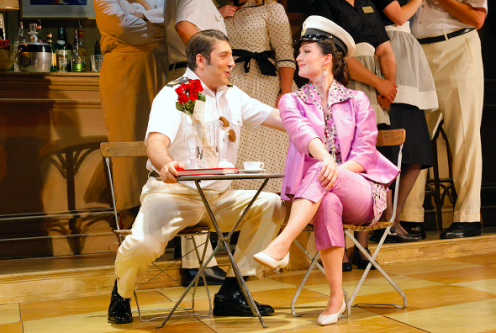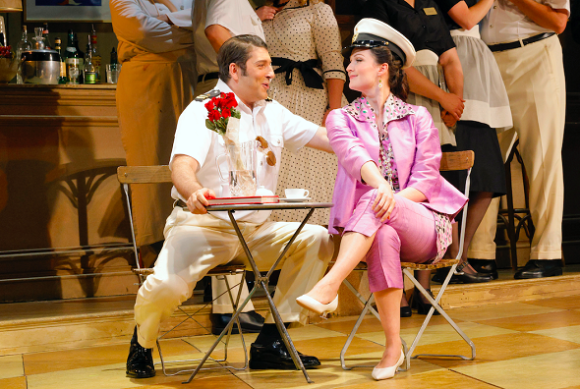 United States Donizetti, The Elixir of Love: Soloists, Chorus and Orchestra of San Francisco Opera / Ramón Tebar (conductor). War Memorial Opera House, San Francisco, 26.11.2023. (HS)
United States Donizetti, The Elixir of Love: Soloists, Chorus and Orchestra of San Francisco Opera / Ramón Tebar (conductor). War Memorial Opera House, San Francisco, 26.11.2023. (HS)

Production:
Director – Daniel Slater
Associate director/Choreographer – Tim Claydon
Production designer – Robert Innes Hopkins
Lighting – Simon Mills
Chorus director – John Keene
Cast:
Adina – Slávka Zámečníková
Nemorino – Pene Pati
Belcore – David Bižić
Dulcamara – Renato Girolami
Giannetta – Arianna Rodriguez
Updating opera settings to a different era from the original libretto, once the sort of thing that caused eye-rolling among aficionados, has become a regular occurrence. At San Francisco Opera, for example, this season has already seen Verdi’s Il trovatore and Wagner’s Lohengrin set in later war-times. Both worked, but not nearly so well as director Daniel Slater’s The Elixir of Love.
This co-production of San Francisco Opera and Lyric Opera of Chicago, originally created at Opera North in the UK, charmed from downbeat to its triumphant finish in the third of six performances at the War Memorial Opera House. Setting the opera in a 1950s Italian coastal resort town, dripping with references to Federico Fellini’s 1960 La Dolce Vita, instead of in Donizetti’s farm village paid dividends on several levels. Most critically, it defined the key players’ social status more clearly and opened possibilities for colorful sets and elegant clothing.
In this version, Adina owns the Hotel Adina and not the village farm, which puts her in social contact with everyone in the cast. Nemorino, rather than an anonymous farmhand, waits tables at the hotel’s outdoor café, underlining the difficulties of his love-besotted station in life, and creating a long list of chuckle-worthy opportunities for stage gags. The ladies-man army sergeant, Belcore, leads a small contingent of Navy men on Vespas onto the stage, upping the contrast between his experienced bravado in wooing Adina and Nemorino’s naïveté.
Dulcamara, the visiting snake-oil salesman who sells Nemorino the titular elixir, arrives in a hot-air balloon instead of a horse-drawn cart. Giannetta, Adina’s friend, remains on stage with Adina rather than showing up mostly for her occasional singing lines. Dulcamara’s mini-me assistant and Belcore’s first mate, both silent roles, added to the fun, and these pals gave the principals extra chances to exert their personalities.

The chorus, rather than a mass of farmworkers, got to play distinctive individuals. Some were tourists. One was a doctor with a tall blonde nurse, another a priest in a cassock and others were waiters or various townspeople (including one overprotective mother who kept pushing her daughter at men as Adina spurned them). No two were alike.
All of this worked well, not least because the cast’s singing and the orchestra’s buoyant playing were so satisfying. The star turn by Pene Pati was a strong fulcrum, making brilliant use of the tenor’s immensely likable personality and nimble, expressive voice. He was perfectly cast in this bel canto role, in full command of dynamics, breath control and beautifully shaded tone. He also managed to invest the character’s awkwardness with unexpected finesse.
Pati is a local favorite, having emerged a potential star as an Adler Fellow in the company’s young artist program, and triumphing as the Duke of Mantua in a 2017 Rigoletto. He has been playing leading men in major theaters ever since. His natural shyness came through clearly here. And yes, his Act II aria, ‘Una furtiva lagrima’, combined all those aspects into a jewel-like moment.
As Adina, the Slovakian soprano Slávka Zámečníková made the most of her United States debut. Her lyric voice, heftier than we usually hear from Adina, handled all the music – including the challenging coloratura in the finale – with ease. Her slim frame and coy demeanor with the athletic Belcore also spotlighted the difference in how an audience might view her with the stockier Nemorino.
In his company debut, French baritone David Bižić held his own on both vocal sheen and personality definition. He played Belcore as a guy accustomed to privilege and deference, not so much mean to Nemorino but annoyed by and dismissive of his mere presence. Italian bass-baritone Renato Girolami as Dulcamara, also making a swaggering company debut, hit all the right notes for a bel canto buffo singer and a con man with more pity for his victims than most.
Soprano Arianna Rodriguez, a first-year Adler Fellow in the company’s young artist cadre who was in last season’s excellent Die Frau ohne Schatten, had a winning stage presence and delivered consistently fine singing.
Conductor Ramón Tebar kept the music lively when it needed to be, supported the singers well, and shaped the more intimate music deftly. Some nice directorial touches brought members of the orchestra on stage, including the ‘La Dulca Vita’ band for the almost-wedding celebration in Act II: John Pearson (trumpet), Zachariah Spellman (tuba) and Marika Yasuda (piano), joined by Nemorino on triangle. The bassoon solo in the introduction to ‘Una furtiva lagrima’ was rendered elegantly by longtime principal Rufus Olivier.
It all added up to a gleeful romp, bringing freshness and insight to this oft-seen opera. If some of the hijinks bordered on slapstick, it was in good fun, and nothing was harmed by it.
Harvey Steiman
